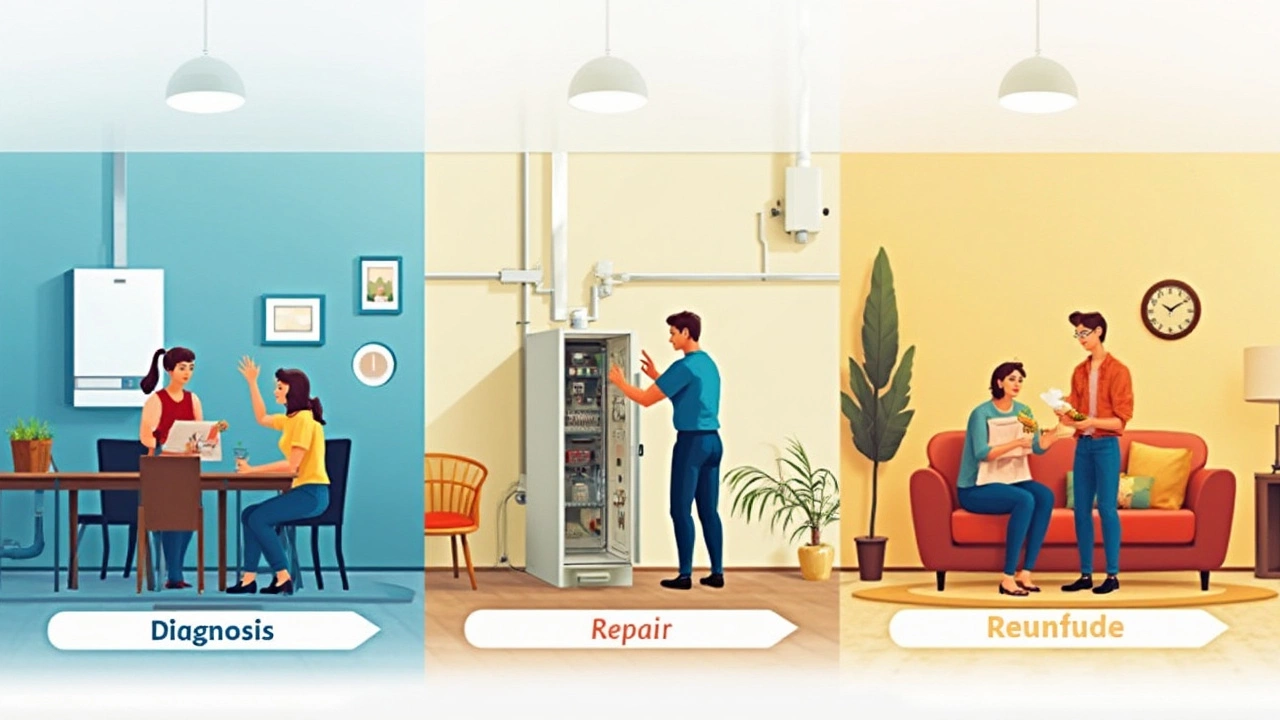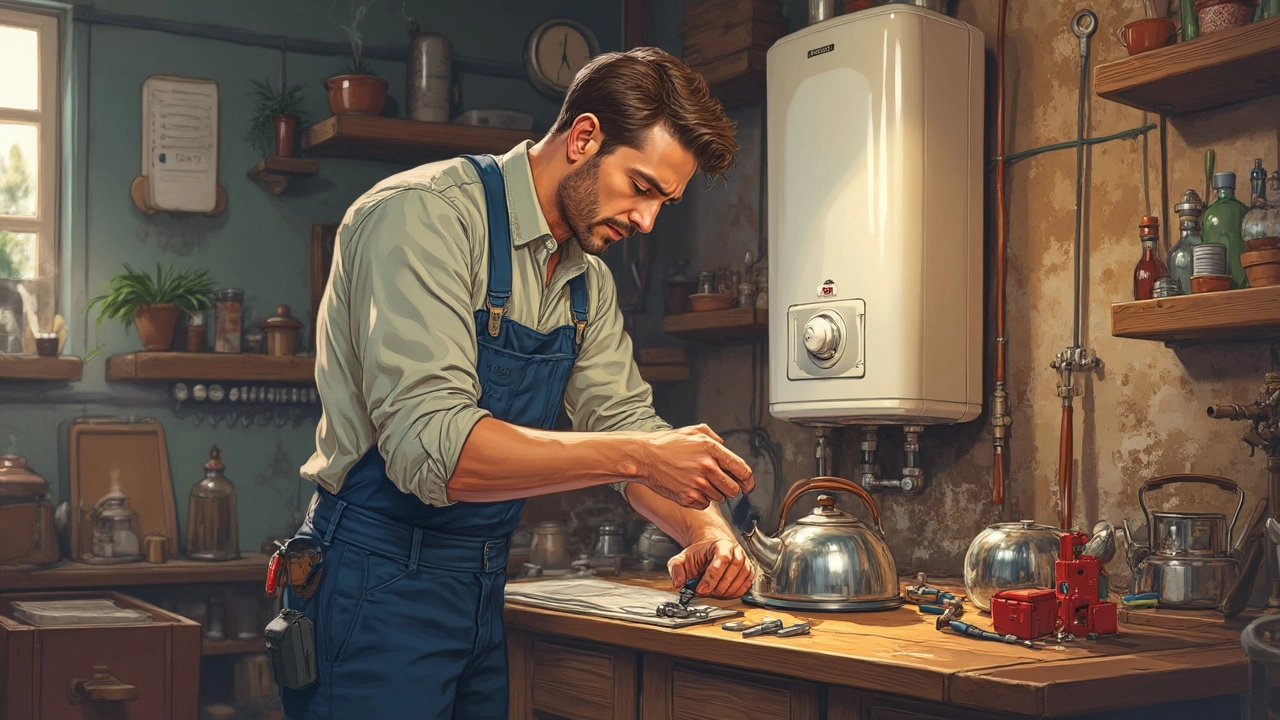Wondering how long a boiler fix usually takes? It's a question many folks ask, especially when left shivering on a cold morning. The timeline for getting your boiler back up and running can vary based on several factors, from the complexity of the problem to the type of your boiler.
On average, simple repairs might only need a couple of hours, while more complicated ones could stretch into days. Knowing what kind of issues your boiler might face and the typical durations for these fixes can help keep stress levels down when your boiler calls it quits.
In this piece, we’ll dive into what's typical for boiler repair times, what snags and glitches could be causing trouble, and some insider tips on how you can speed up the process. By better understanding these elements, you’re more apt to keep the process smooth and efficient. Let's get started on banishing that chill for good!
Typical Repair Times
Ready to get the lowdown on boiler repair times? Whether you're dealing with a minor glitch or a big breakdown, knowing how much time it could take is pretty valuable. Generally speaking, the time it takes to fix a boiler can range from a couple of hours to a couple of days, but here's a closer look at what you might expect.
Simple Fixes
If you're lucky, your boiler issue might be something super straightforward like a pressure drop or a minor thermostat problem. These can often be fixed in just a couple of hours. A skilled technician can spot simple issues quickly and typically deal with them on the spot.
Moderate Issues
Somewhat more tricky problems can take a bit longer. If your boiler needs component replacement, like a pump or valve, expect repairs to stretch anywhere from half a day to a full day. The time here often depends on whether the needed parts are readily available.
Complex Repairs
For the big stuff, like serious leaks or a faulty heat exchanger, you're looking at a more extended repair period. These repairs might take a couple of days, especially if additional diagnostics are needed or parts must be ordered. Patience is key, but it usually gets there in the end!
| Repair Type | Typical Duration |
|---|---|
| Basic Adjustments | 2-3 Hours |
| Component Replacement | Half-Day to Full Day |
| Major Overhauls | 1-3 Days |
The exact time can vary based on several factors, including the technician's expertise and any logistical hurdles that come up. Sometimes it's just about having the right spare part at the right time!
Common Boiler Problems
When your boiler acts up, it's often due to some common culprits. Understanding these smash-ups can save you time and maybe even some cash.
1. No Heat or Hot Water
This is a panic button moment for many. The main villains here can be a broken diaphragm or airlock, issues with the thermostat, or low water levels. Checking the thermostat settings or topping up the water might solve the problem, but often, you'll need a pro to look at it.
2. Leaking and Dripping
Leaks can stem from various parts of the boiler, and finding the source is crucial. It can be loose pipework or that the pressure valve is acting up. Leaving a leak can lead to more significant issues down the line, so a quick boiler repair is advised.
3. Strange Noises
If you hear banging, whistling, or gurgling, it's not a poltergeist—it might be air in the system or low water pressure. Sometimes, it's just a build-up of limescale known as 'kettling.' These sounds are a signal for a technician to inspect the system.
4. Pilot Light Going Out
This is pretty standard and could be due to a broken thermocouple or a draught blowing out the light. Sometimes, it's an issue with the gas supply. While DIY attempts can relight the pilot, getting a professional hand keeps things safe and sound.
5. Low Boiler Pressure
For a boiler to work optimally, it must maintain a specific pressure. Low pressure usually flags a leak or an issue with the pressure relief valve. Checking the pressure gauge is a good first step; if it's below 1 bar, it's time to call in for a boiler service.
| Problem | Typical Cause |
|---|---|
| No Heat or Hot Water | Diaphragm, Airlock |
| Leaking | Pressure Valve, Pipework |
| Strange Noises | Air, Low Water Pressure |
| Pilot Light Goes Out | Thermocouple, Draught |
| Low Pressure | Leak, Pressure Relief Valve |
Knowing these problems helps manage expectations and discuss with a technician what might be going wrong. It’s like a heads-up before the trip to the shop—saves time and maybe money!

Factors Affecting Repair Time
Ever wondered why some boiler repairs breeze by while others seem to drag on forever? Let's break it down. The time it takes to fix your boiler isn't just about the kind of problem you're facing.
Type of Issue
Not surprisingly, a simple issue like a faulty thermostat isn’t going to take as long as replacing a heat exchanger. A quick inspection usually identifies the problem's severity. For instance, part replacements require time spent waiting for the right components to arrive, adding to the overall delay.
Boiler Age and Model
If your boiler is ancient, parts might be hard to come by, which can add significant waiting time. Newer models might seem complicated, but they often come with the advantage of easy-to-find components. Sometimes, newer boilers also have off-road technology that speeds up diagnostics.
Availability of Parts
When something’s broken, parts availability plays a big role. For common boilers, parts are typically in stock and can be swapped quickly. However, for rarer models, finding that specific part might take longer.
| Type of Boiler | Average Repair Time |
|---|---|
| Combi | 2-4 hours |
| System | 3-6 hours |
| Conventional | 4-8 hours |
Technician Experience
A seasoned technician can work wonders in speeding up your repair time. They've likely seen the quirkiest of issues and can cut through common troubleshooting mistakes that might stump a less experienced repair-person.
Time of the Year
Timing is everything. If your boiler decides to give up during peak seasons like winter, you might have to wait longer as technicians juggle multiple urgent calls. During quieter months, the service availability isn’t as snugged, potentially speeding up the process.
So, the next time your boiler clocks out, consider these factors before you plan your day around the repair. Understanding these can keep surprises to a minimum and get you back to comfort pronto!
Tips for Faster Repairs
If your boiler repair stretches longer than expected, it can be a real hassle. So, how do you make it snappy? Here are some practical tips to help get your heating system humming quickly and efficiently.
1. Know When to Call a Pro
As tempting as it might be to DIY, if you're not experienced with boilers, it's best to call in a professional. They’ve got the skills and tools to diagnose the issue accurately and deliver a prompt fix. Not to mention, tinkering around without proper know-how can lead to more damage and longer downtime.
2. Keep Up with Regular Maintenance
One of the simplest ways to minimize the time needed for repairs is regular maintenance. Routine check-ups can catch potential problems before they snowball into major issues. If your boiler is squeaky clean and well-maintained, repairs are often less complex and quicker.
3. Describe the Symptoms Clearly
When the repair technician arrives, giving them a detailed rundown helps them understand where to start. Mention any funny noises, leaks, or weird behaviors. The more info, the better the technician can pinpoint the problem.
4. Have Documents Handy
Dig out any manuals or previous repair records. These documents can provide valuable insights into past fixes or particular quirks of your boiler model. This can speed up diagnostics and avoid reworking what was already handled.
5. Choose the Right Repair Service
Not all repair services are created equal. Pick a service with good reviews and a stellar track record for efficiency. An experienced service will have access to the right parts and know-how to handle your boiler model quickly.
6. Consider a Service Contract
Many providers offer service contracts that involve regular inspections and priority services during emergencies. It can save time and often money in the long haul, as they’ll be familiar with your setup and any unique needs it has.
By staying proactive and organized, you won't just have a boiler that gets fixed faster but potentially avoid some headaches altogether. It's all about being prepared and knowing when it's time to call in the experts!

I am an expert in the services industry with a focus on appliance repair. My passion lies in understanding how things work and educating others in simple, engaging ways. This enthusiasm fuels my writing, where I delve into topics around appliance maintenance and troubleshooting. I aim to make these subjects clear and accessible to all readers.